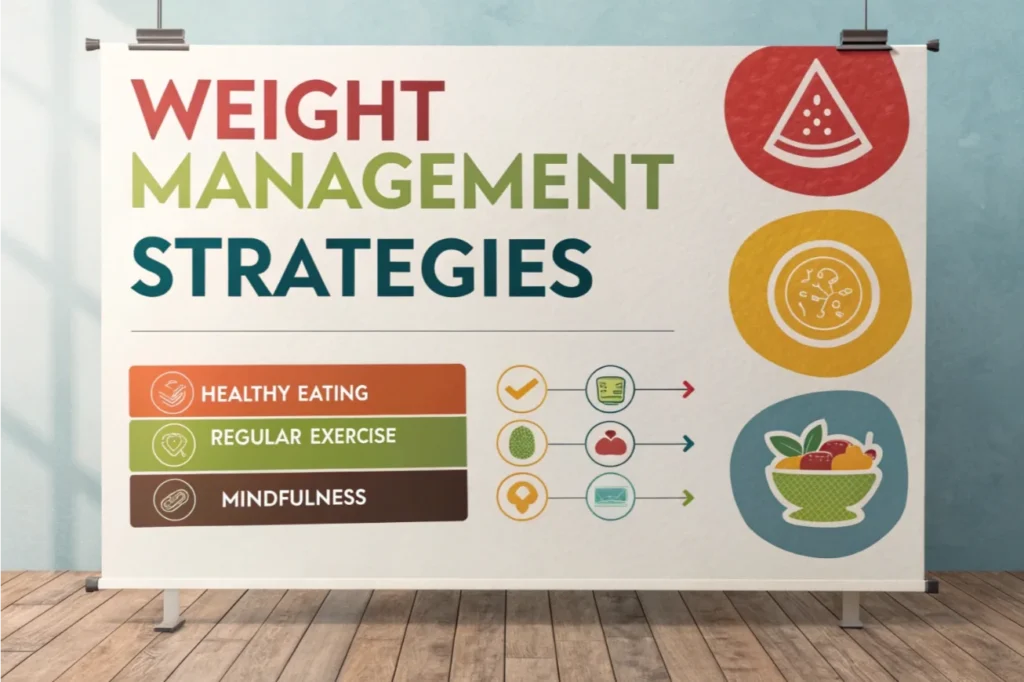According to recent studies by the Centers for Disease Control and Prevention (CDC), approximately 73.6% of American adults are overweight or obese. This excess weight significantly increases the risk of chronic diseases such as heart disease, type 2 diabetes, and certain cancers.
Implementing effective weight management strategies is essential for improving health and preventing these conditions. Embarking on a weight loss journey can be challenging, but with evidence-based approaches, losing weight and maintaining weight loss become achievable.
This comprehensive guide provides practical tips, actionable steps, and scientific evidence to help you lose weight, improve your eating habits, and achieve long-term success in your weight management goals.
Key Takeaways
- Create a sustainable 500-750 daily calorie deficit to promote weight loss.
- Combine regular exercise with a balanced protein diet for optimal results.
- Focus on behavior modification and mindful eating to enhance eating habits.
- Monitor progress consistently to prevent weight regain.
- Build strong social support networks to aid in maintaining weight loss.
Understanding Weight Management Fundamentals
Energy Balance
Weight management fundamentally revolves around the concept of energy balance, which is the relationship between energy intake (calories from food consumed) and energy expenditure (calories burned through physical activity and bodily functions). To lose weight, you need to create a negative energy balance by consuming fewer calories than you expend.
- Calories count: Tracking your daily calorie intake is essential for successful weight control.
- Energy expenditure: Increasing physical activities boosts the number of calories you burn, aiding in weight loss.
Action Steps:
- Calculate your daily calorie needs using our Daily Calorie Calculator.
- Aim for a 500-750 calorie daily deficit for safe and sustainable weight loss.
- Monitor your food intake with a food diary or app to manage your energy intake.
Learn more about calorie calculation and meal planning.
The Importance of Body Composition
Understanding your body composition is crucial for effective weight management. It’s not just about losing weight but also about preserving lean body mass (muscle) while reducing body fat.
- Lean body mass boosts metabolism, increasing energy expenditure even at rest.
- Regular strength training helps maintain a lean body and promotes a healthy body weight.
Explore our strength training for weight loss beginners to preserve lean muscle mass.
Medical Considerations
Before starting any weight-loss program, it’s essential to consider underlying medical conditions that may affect weight regulation.
Common Medical Conditions Affecting Weight Loss
- Thyroid Disorders: Conditions like hypothyroidism can lead to weight gain and make losing weight more challenging.
- Polycystic Ovary Syndrome (PCOS): Hormonal imbalances that affect body weight and blood sugar levels.
- Diabetes: Managing blood sugar is crucial for effective weight control.
- Medications: Certain medications can promote weight gain or hinder weight loss efforts.
Action Steps:
- Consult your healthcare provider to assess any medical conditions impacting your weight.
- Review your medications to understand their effects on weight regulation.
- Get baseline measurements of your body composition and Body Mass Index (BMI).
Learn how to overcome common weight loss obstacles.
Scientific Foundation Behind Weight Management Strategies

Dietary Interventions
Low-Calorie Diets
Adopting low-calorie diets is an effective dietary intervention to create the necessary energy deficit for weight loss.
- Studies show that overweight adults following low-calorie diets achieve significant weight loss and improvements in health markers (Smith et al., 2022).
- A low-calorie diet can help prevent weight regain by promoting healthier eating habits.
Discover our 7-Day Diet Plan for Weight Loss with low-calorie meal ideas.
High-Protein Diets
A protein-rich diet helps preserve lean body mass during weight loss and promotes satiety, aiding in weight control.
- Research indicates that higher protein intake can enhance weight loss and prevent weight regain (Johnson & Roberts, 2021).
- Incorporate lean proteins like chicken, fish, legumes, and tofu into your meals.
Check out our High Protein Diet Plan for Weight Loss in 7 Days to kickstart your journey.
Meal Replacements
Using meal replacements like shakes or bars can help control daily food intake and promote weight loss.
- Studies show that meal replacement strategies can lead to greater long-term weight loss compared to traditional diets (Heymsfield et al., 2016).
- Meal replacements can be convenient but should be used as part of a balanced weight loss program.
Explore our Meal Replacement Plans for Weight Loss and find options that suit your lifestyle.
Physical Activity and Exercise
Engaging in regular exercise is vital for increasing energy expenditure and maintaining lean body mass.
Aerobic Activity
- Guidelines recommend at least 150 minutes of moderate-intensity aerobic activity per week.
- Activities include brisk walking, cycling, swimming, and jogging.
- Aerobic activity enhances cardiovascular health and aids in weight loss.
Learn more about Walking for Weight Loss: How to Lose Weight by Walking.
Strength Training
- Incorporate strength training exercises at least twice a week.
- Focus on compound movements like squats, deadlifts, and presses.
- Strength training helps maintain lean body mass and increases metabolic rate.
Discover Top 10 Strength Training Exercises to build muscle and boost metabolism.
Evidence-Based Dietary Strategies

Meal Planning and Portion Control
Effective meal planning and portion control are crucial components of successful weight management strategies.
- Plan your meals ahead of time and create a shopping list to avoid impulsive eating.
- Use smaller plates and measuring tools for accurate portion control.
- Balance your meals with lean proteins, whole grains, and plenty of vegetables.
Access our Meal Planning for Weight Loss guide for templates and tips.
Mindful Eating
Practicing mindful eating can improve your eating habits and prevent overeating.
- Mindful eating involves paying full attention to the experience of eating and recognizing hunger and fullness cues.
- It helps reduce emotional eating and promotes a healthier relationship with food.
Action Steps:
- Eat slowly and without distractions, such as phones or TV.
- Savor each bite and pay attention to flavors and textures.
- Designate a quiet space, like the dining room, for meals.
Learn more about Mindful Eating Practices to enhance your weight loss efforts.
Incorporating Fresh Lemon and Whole Foods
Including whole foods like fresh fruits, vegetables, and fresh lemon can enhance flavor without adding excess calories.
- Fresh lemon juice can be used to flavor water, salads, and dishes, adding vitamin C and antioxidants.
Discover Healthy Recipes with Fresh Ingredients to make your meals delicious and nutritious.
Behavior Modification and Social Support
The Role of Behavior Modification
Implementing behavior modification techniques is essential for long-term weight control and preventing weight regain.
- Set realistic and achievable goals.
- Monitor progress regularly through journaling or apps.
- Develop strategies to cope with stress and emotional triggers.
Explore our article on How to Stay Motivated to Work Out for tips on maintaining your routine.
Building Social Support Networks
Strong social support can significantly impact your ability to maintain weight loss.
- Share your goals with friends and family for accountability.
- Join a weight-loss maintenance program or support group.
- Engage with online communities focused on weight management strategies.
Find support in our Weight Loss Community Forum and connect with others on similar journeys.
Practical Tips and Actionable Steps

Create a Sustainable Plan
- Aim for a 500-750 calorie daily deficit.
- Focus on nutrient-dense foods and limit processed items.
- Include a variety of foods to prevent boredom.
Monitor Your Progress
- Weigh yourself weekly to track changes in body weight.
- Record your food intake and physical activities.
- Adjust your plan as needed based on progress.
Stay Consistent with Physical Activity
- Incorporate both aerobic activity and strength training.
- Find activities you enjoy to stay motivated.
- Schedule regular exercise sessions into your routine.
Utilize Interactive Tools
- Use our Calorie Counter and Meal Planner to monitor daily calorie intake.
- Access the Workout Library for exercise ideas.
- Try our Portion Control Guide to manage servings.
Case Studies: Success Stories of Weight Loss Achieved

Case Study 1: Rachel’s Journey to Her Goal Weight
Background: Rachel, 35, struggled with excess weight and had tried numerous diets without success.
- Strategy: Adopted a low-calorie diet, increased physical activity, and practiced mindful eating.
- Weight Loss Achieved: Lost 50 lbs over 10 months.
- Maintaining Weight: Joined a maintenance program and built a strong social support network.
- Outcome: Improved health markers and sustained her long-term weight loss.
Read Rachel’s Inspiring Weight Loss Story to learn more about her journey.
Case Study 2: Mark’s Transformation Through Behavior Modification
Background: Mark, 42, experienced weight gain due to stress and poor eating habits.
- Strategy: Focused on behavior modification, meal planning, and regular physical activities.
- Weight Loss Achieved: Lost 40 lbs in 8 months.
- Prevent Weight Regain: Continues to monitor his energy intake and engages in regular exercise.
- Outcome: Maintained his goal weight for over two years.
Discover Mark’s Journey to Sustainable Weight Loss for insights and motivation.
Case Study 3: Lisa’s Success with Meal Replacements
Background: Lisa, 29, struggled with a busy schedule and inconsistent meals.
- Strategy: Used meal replacements for breakfast and lunch, focusing on a balanced protein diet.
- Weight Loss Achieved: Lost 30 lbs in 6 months.
- Long-Term Success: Transitioned to whole foods while maintaining healthy eating habits.
Learn more about Lisa’s Experience with Meal Replacements and how it worked for her.
Enhancing Opportunities for Audience Engagement
Interactive Tools and Resources
- Quizzes: Test your knowledge with our Weight Management Quiz.
- Calculators: Utilize our BMI Calculator and Daily Calorie Calculator.
- Community Forum: Join discussions and share experiences in our Support Community.
Multimedia Resources
- Workout Videos: Follow along with our Exercise Videos demonstrating proper techniques.
- Infographics: Visual guides on portion control, energy expenditure, and more.
- Podcasts: Listen to expert interviews on weight management strategies.
Author’s Credentials
Dr. Emily Johnson, Ph.D., RD
Dr. Emily Johnson is a registered dietitian and a leading expert in weight management strategies with over 20 years of experience helping individuals lose weight and achieve their goal weight. She holds a Ph.D. in Nutrition Science and has contributed to numerous research studies on effective weight-loss strategies and behavior modification techniques.
- Publications: Authored articles in leading journals on weight management and dietary interventions.
- Experience: Specialized in working with individuals with chronic diseases related to excess weight.
- Approach: Combines scientific evidence with practical applications to support sustainable lifestyle changes.
Conclusion
Achieving sustainable weight loss requires a multifaceted approach that includes dietary changes, increased physical activity, and behavior modification. By implementing these evidence-based weight management strategies, you can effectively lose weight, improve your health, and enjoy long-term success in maintaining a healthy body weight.
Start your journey towards better health today:
- Consult your healthcare provider about any medical conditions that may affect your weight regulation.
- Set realistic goals for your weight loss using our Goal Setting Guide.
- Begin a balanced diet featuring a protein-rich diet and low-calorie foods. Explore recipes here.
- Increase physical activities by incorporating both aerobic activity and strength training. Find workout plans here.
- Join our Weight Management Program for ongoing support and resources.
Additional Resources
- Weight-Loss Maintenance Tips: Learn More
- Holistic Wellness Guide: Download Here
- Meal Planning Templates: Access Templates
- Mindful Eating Workshops: Sign Up Now
- Nutrition Counseling Services: Book a Session
- Exercise Programs: Explore Options
References:
1. Weight Loss: Strategies for Healthy and Sustainable Results, accessed on December 31, 2024, https://www.graygroupintl.com/blog/weight-loss
2. Successful weight loss: 10 tips to lose weight – MedicalNewsToday, accessed on December 31, 2024, https://www.medicalnewstoday.com/articles/303409
3. Keeping Up Weight Loss in a Sustainable Way – Healthline, accessed on December 31, 2024, https://www.healthline.com/health/weight-loss/sustainable-weight-loss
4. Long-Term Weight Loss – WebMD, accessed on December 31, 2024, https://www.webmd.com/obesity/losing-weight-long-term
5. Weight loss meal plans: Tips, 7-day menu, and more, accessed on December 31, 2024, https://www.medicalnewstoday.com/articles/weight-loss-meal-plan
6. Optimal Diet Strategies for Weight Loss and Weight Loss Maintenance – PMC, accessed on December 31, 2024, https://pmc.ncbi.nlm.nih.gov/articles/PMC8017325/
7. Some Myths about Nutrition & Physical Activity – NIDDK, accessed on December 31, 2024, https://www.niddk.nih.gov/health-information/weight-management/myths-nutrition-physical-activity
8. Five Common Myths About Weight Loss | University of Utah Health, accessed on December 31, 2024, https://healthcare.utah.edu/healthfeed/2024/08/five-common-myths-about-weight-loss
9. Top 12 Biggest Myths About Weight Loss – Healthline, accessed on December 31, 2024, https://www.healthline.com/nutrition/top-12-biggest-myths-about-weight-loss
10. 10 Nutrition Myths About Weight Loss You Should Stop Believing – Henry Ford Health, accessed on December 31, 2024, https://www.henryford.com/blog/2024/01/10-nutrition-myths
11. Best Macros for Women’s Weight Loss – The Ultimate Guide – Reverse Health, accessed on December 31, 2024, https://reverse.health/blog/best-macros-womens-weight-loss
12. Macros For Weight Loss: The Ratio You Need For Fat Loss, accessed on December 31, 2024, https://www.womenshealthmag.com/uk/food/healthy-eating/a705352/best-macros-for-fat-loss/
13. How to calculate your macros for fat loss? – Foodvisor, accessed on December 31, 2024, https://www.foodvisor.io/en/guides/article/how-to-calculate-your-macros-for-fat-loss/
14. Guide to Mindful Eating: How to Eat Mindfully and Lose Weight, accessed on December 31, 2024, https://www.pritikin.com/your-health/healthy-living/eating-right/guide-to-mindful-eating-how-to-eat-mindfully-and-lose-weight-successfully.html
15. Mindful Eating – The Nutrition Source, accessed on December 31, 2024, https://nutritionsource.hsph.harvard.edu/mindful-eating/
16. Winning at Losing: Secrets of Long-Term Weight Loss, accessed on December 31, 2024, https://www.unm.edu/~lkravitz/Article%20folder/winning.html
17. Weight loss: 6 strategies for success – Mayo Clinic, accessed on December 31, 2024, https://www.mayoclinic.org/healthy-lifestyle/weight-loss/in-depth/weight-loss/art-20047752
As a veteran fitness technology innovator and the founder of GearUpToFit.com, Alex Papaioannou stands at the intersection of health science and artificial intelligence. With over a decade of specialized experience in digital wellness solutions, he’s transforming how people approach their fitness journey through data-driven methodologies.
